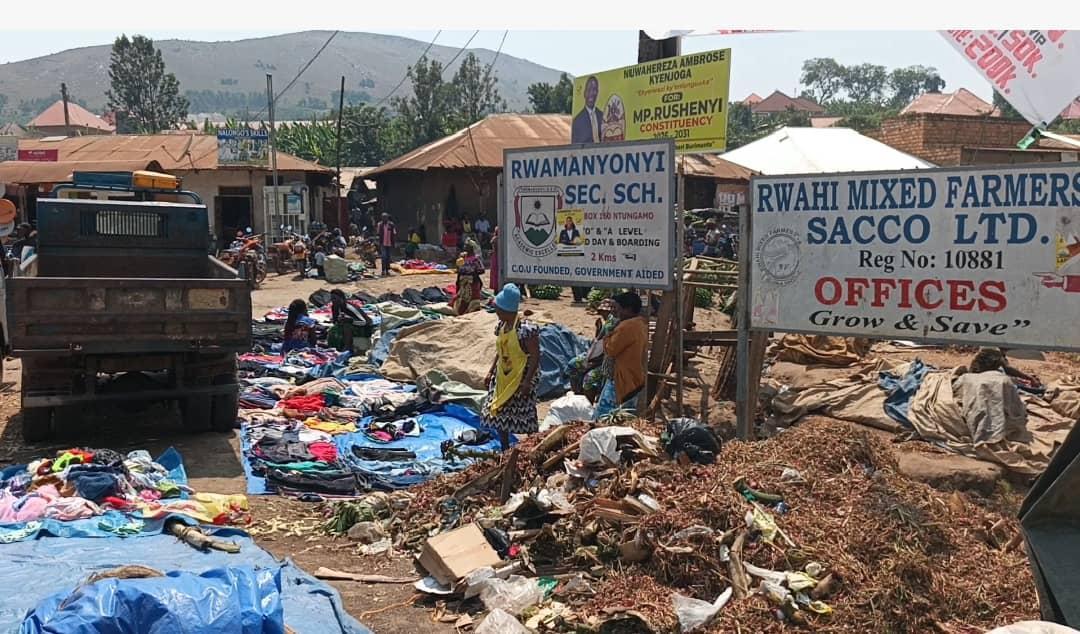Africa-Press – Uganda. Traders and residents at Rwentobo-Rwahi Onion Market in Ntungamo District are raising alarm over worsening sanitation conditions, citing a complete lack of adequate toilet facilities and poor waste management in the bustling trading hub that serves over 800 people daily.
Despite its strategic importance—drawing onion traders from Rukiga, Mbale, Karamoja, South Sudan, Rwanda and beyond—the market has only a single public toilet which residents say is either unusable or grossly insufficient.
Traders are forced to relieve themselves in bushes or return home during work hours, raising serious concerns about hygiene and public health.
“We live here to our places of residence to ease ourselves. We don’t have where to ease ourselves from. We have no toilets,” said Daniel Ainerukundo, a trader at the market.
Another vendor, Alex Twinomugisha, added, “From work, we head behind those houses to ease ourselves and end up in fights with the people who live there. Anywhere we find becomes our toilet.”
Sanitation-related complaints are further aggravated by unmanaged garbage, with vendors now operating just metres from decaying waste.
“We work with rubbish here in the market. We are tired of it,” said one trader. “Garbage is collected maybe once a week, but within two days it piles up again and starts smelling.”
Residents now fear a potential disease outbreak if authorities fail to act swiftly. “We get stomach aches due to the smell. The situation is unbearable,” noted another local.
The LC2 Chairperson of Katoma Ward, Stephen Sabiti, whose residence is near the market, warned that traders have resorted to relieving themselves in nearby plantations and public walkways, angering residents and threatening food security.
“These traders bring a lot of money to this town, but they are not safe,” said Sabiti. “If nothing is done, we could have a serious health crisis. I urge the district and town council to intervene urgently.”
In response, the Principal Town Clerk of Rwentobo-Rwahi Town Council, Bright Joga, admitted that current sanitation facilities are inadequate.
He said the only waste collection service in place is managed by a private contractor using a tukutuku (motorized tricycle), which is overwhelmed by the volume of refuse produced during the onion trading season.
“During the peak season, we receive up to ten truckloads of onions per day, but the contractor only uses a small tukutuku for garbage collection. It’s simply not enough,” said Joga.
He acknowledged that traders often sell goods next to garbage heaps but emphasized that the town council has introduced a “sanitation day” and is encouraging the public to use onion waste as manure to reduce pressure on disposal systems.
Joga also revealed that construction of a new four-stance public toilet is included in the current financial year’s development plan and is expected to begin soon.
“The public toilet exists, but it is not enough. With a population of around 800 people in the market, we need more sanitation facilities than what is currently available,” he said.
Aside from sanitation, traders are also grappling with economic difficulties, reporting unstable onion prices that have plummeted from Shs25,000 to as low as Shs10,000 per basin.
As frustrations mount, traders say the lack of sanitation infrastructure threatens not just their health, but the reputation and future of the entire market.
“Authorities cannot keep ignoring us. We bring revenue to this town. All we are asking for is a clean place to work and decent facilities,” said one vendor.
For More News And Analysis About Uganda Follow Africa-Press






